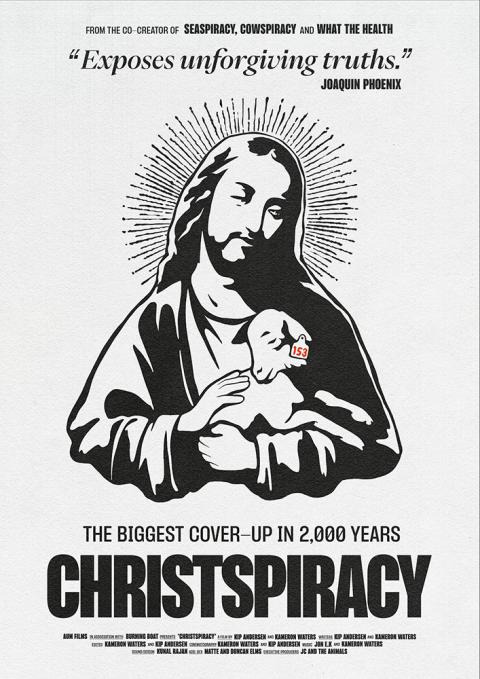
Filmmakers Kip Andersen, left, and Kameron Waters, right, with a rescuer and a lamb in a scene from "Christspiracy." (Image courtesy Christspiracy)
Is there an ethical or spiritual way to kill an animal?
That’s the question that animates "Christspiracy: The Spirituality Secret," the forthcoming documentary that suggests Jesus and many of his early followers opposed the killing and eating of animals. This bombshell truth, the filmmakers argue, is part of "the biggest coverup in the last 2,000 years."
The film’s premise may be controversial, but the minds behind it are no strangers to contention. Filmmaker Kip Andersen also co-created the hit documentaries "Seaspiracy," "Cowspiracy" and "What the Health," provocative exposés of the fishing, dairy and meat industries. These earlier films garnered countless views and plenty of backlash — but indisputably left an impression.
Still, by adding religion to the mix, Andersen expects to upset even more people. According to a Kickstarter campaign, which has raised a little over $433,000 of its $300,000 goal, the filmmakers claim they parted ways with Netflix after the platform asked for redactions from the film. Andersen said this led him and fellow filmmaker Kameron Waters to buy back the rights to their film.
Waters told RNS in an email that the pair "wanted to tell the story the way it was unfolding." Netflix, he claimed, wanted to go a different direction, including "some particular parts they preferred cut that we didn’t agree with as we feel they are vital to the narrative, especially around Christ."

Poster for “Christspiracy.” (Image courtesy Christspiracy)
On Wednesday (March 20), the film will show in a one-night-only event in over 650 theaters worldwide; in the U.S., the film will also show on March 24.
Seven years in the making, the fast-paced film tracks Andersen, a self-described "quasi-spiritual Buddhist yogi," and Waters, a onetime Southern Baptist and gospel musician, as they seek new insights about the compatibility of religion and meat eating. The pair go from investigating a Kosher farm in Israel to tracking a cow-smuggling truck in New Delhi, examining the spiritual frameworks people employ while eating, farming, selling and slaughtering animals.
Amid the film’s many action shots, its through-line is the case for Christ’s opposition to eating and killing animals. The evidence includes an interpretation of Jesus’ well-documented cleansing of the temple. Animal theologian Andrew Linzey and James Tabor, a retired religious studies professor from the University of North Carolina at Charlotte, suggest in the documentary that the temple was operating as a commercial slaughterhouse in Jesus’ time. When the gospels record Jesus calling the temple a den of thieves, he’s quoting Jeremiah 7, a passage that references idols and animal sacrifice. In the film, Oxford scholar Deborah Rooke translates the Hebrew word "parits," often interpreted as "thieves," as meaning "violent one." This, the film claims, shows that Jesus was condemning animal sacrifice.
"The fact that four days before he was crucified, he goes in and shuts down the temple to basically stop animal sacrifice … he was one of the most hardcore animal activists, the 'OG' animal activist," Andersen told RNS in a Zoom call.
In the documentary, the filmmakers say Jesus not only sacrificed his life for humans, "but to stop the killing of animals as well."
In another part of the film, Keith Akers, an activist and author of "The Lost Religion of Jesus" (2000), refers to early sources that characterize Jesus’ brother James and cousin John the Baptist as vegetarian. "Jesus is simply carrying on the family tradition," he says.
The film also cites early descriptions of the Ebionites, a sect that described Jesus as an opponent of animal sacrifice who refused to eat lamb during Passover. According to the 4th-century bishop Epiphanius, who condemned the Ebionites, the group also denied the divinity of Christ. Some scholars, including Robert Eisenman, also featured in the film, have characterized the Ebionites as followers of Jesus’ brother, James.
The documentary suggests that this vegetarian sect, along with two other 4th-century sects, the Nazoraeans and Nasaraeans, are all rooted in the original Jesus movement. And with added scriptural context, including apparent critiques of animal sacrifice in the Old Testament, John the Baptist’s choice of baptism instead of animal sacrifice and Jesus’ quoting of the Hosea passage "I desire mercy, not sacrifice" in the Gospel of Matthew, the filmmakers conclude that the authentic Jesus movement opposed the killing and eating of animals.
"It’s so overwhelmingly obvious when you see this all put together that not only did he not eat animals, that this Nazarene movement he was part of were fiercely against killing animals," Andersen told RNS.
Tabor told RNS that when Jesus was growing up, "the normal assumption" would be that, as a Jew, Jesus consumed lamb during Passover. "But once he starts preaching or teaching, it’s entirely possible … that he began to have a new covenant view of (eating animals)," he said.
Yii-Jan Lin, a New Testament professor at Yale Divinity School, said there were many Christian sects spawned from the Jesus movement, and we can’t say whether these, in particular, "represent Jesus correctly."
She added that it seems strange that Jesus and his early followers would be against animal sacrifice, given the Gospels’ analogy of Jesus as the paschal lamb. "Jesus is upheld as the quintessential animal sacrifice. That becomes part of the entire early Christian allegory around his death," she said.
The film goes on to discredit the many stories of Jesus eating or distributing fish, saying the fish references are later additions, mistranslations or metaphors. Finally, the film features scholars who suggest Jesus did not eat lamb for Passover at The Last Supper and who emphasize that God’s Genesis command for humans to have "dominion" over creation is a mistranslation that ought to be read as "stewardship."
All of this leads the filmmakers to conclude that the true, vegetarian form of Christianity was overshadowed by the version promoted by Paul, who did eat meat.
"It becomes obvious that in full context, the story is that God’s creatures are to be protected and honored and that we have fallen away when we don’t do that," Waters told RNS.
Advertisement
Though the claims about Christ are the focal point, the bulk of the film explores the spiritual methods and frameworks employed in the killing of animals today. For the filmmakers, witnessing the unnecessary deaths of countless animals was the most difficult part of the process.
In one scene, the team records the Gadhimai festival, a Hindu festival in Nepal where tens of thousands of animals are slaughtered. The event was disturbing both because of the sheer number of animals killed, according to Andersen, and because it shed light on how many more animals are killed behind closed doors in "the West."
For Waters, the most challenging scene was at Polyface Farms in Virginia, where Waters filmed a rabbit being hung upside-down and killed, while a child looked on.
"I could have done something if I wasn’t filming, but I knew that I had to film it to be able to show what the reality is," said Waters.
By the end, the filmmakers reason that all religions, at their root, value compassion for all beings. Religious systems that uphold eating animals aren’t representative of their own foundational Scriptures or leaders, and believers who kill and eat animals are, consciously or not, missing the point of their own religions.
For Lin, the documentary’s evidence about Christ’s opposition to killing animals, though interesting, doesn’t prove anything definitively. And drilling down to try to pinpoint the historical Jesus’ original beliefs regarding animals is a task that’s both elusive, she said, and unnecessary.
"I think we can make ethical arguments just fine from the 21st century against eating animals," said Lin. "We don’t actually need the historical Jesus to be against eating animals."
Tabor was more persuaded: "I also have come to a similar conclusion of the film, that there was a version of the Jesus movement that was definitely vegetarian, but probably vegan," he told RNS.
For Waters, his many years researching and creating the film have strengthened his convictions that Jesus would have looked out for the last and the least, including animals.
"It’s only deepened my faith," Waters said about the film. "My faith has always been to aim to be Christlike. I feel now I have a better picture … of what that looks like, now that I know what it means with our relationship and our connection to animals."




